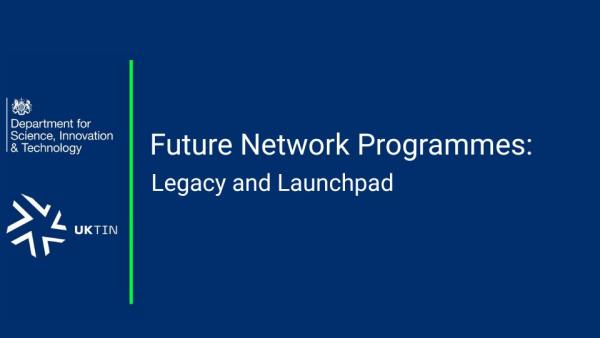The UK Government is committed to diversifying the telecoms supply chain, but diversification can cover a multitude of principles, and different players in the ecosystem will have varying viewpoints on what diversification means for them. As a part of our new content series, Perspectives on Diversification, UKTIN hears from James Body, CEO at Telet Research.

Telecoms are strategic. Unless you can communicate, you are dead in the water. The UK has had a really good history with communicating, going back to the invention of radio. We have always been up there at the cutting edge, even though we appear to have lost the ability to manufacture
The aim of supply chain diversification is to protect national security by not being reliant on foreign vendors such as Nokia, Ericsson or Chinese manufacturers. Diversification could be recast as “choice”.
Ideally that means that there will be British vendors in the mix. Historically we had Marconi, Plessey, GEC and Racal, but we have to be realistic and appreciate that we are not going to create a single company which has the entire product portfolio of one of the Scandinavian companies whose histories date back to the mid 1800s.
To be successful we need to build a complete mobile ecosystem that can supply everything you need for a mobile network, where components can be sourced from a number of vendors. There are plenty of candidates from friendly nations: Nvidia, Cisco, Juniper and Dell are all good starting points, even if the similar software handset lockout from Apple and Google means that we are swapping Nordic dominance for North American. There are now suppliers of a wide range of kit from around the world. India has a very strong IT heritage; Apple is currently building some iPhone 14s there. And what we are looking for is a diversification of nationalities of suppliers as well as suppliers. This will lead to different understanding of use cases and a variety of solutions.
A good example is the way that we have used small cells in a rural environment to provide Multi Operator Neutral Host services whilst keeping costs down. This allows us to provide mobile services quickly and cost effectively in areas in which users live and work in a manner that is far more commercially attractive than the conventional MNO macrocell approach.
There is more scope for more products born out of market needs that are outside of the standard services offered by the big operators. For example, use of software defined radios to serve waveforms with different operational characteristics within one single radio band, potentially offering both narrow band IoT and 2G services alongside faster (but more localised) wide band 4G and 5G services.
Diversification needs to go down below the level of the infrastructure vendors to include the component level. If you only have one or two major sources of supply for all the key components, then you become vulnerable to disruption from those primary sources of supply. This has been demonstrated by the shortages of silicon based components over the last three or four years. We have got to a stage now where China is so important for the supply of silicon and affordable technology, that any disruption to the supply chain in China causes major implications.
There is a big part for open source software to play as part of the diversification plan; because open source is owned by the community, not owned by big corporations, it cannot be directly controlled for political or economic gain, or be commercially withdrawn. Also, open source projects are built around cooperative communities. Whilst individual projects may have leaders, they direct the evolution of a project, but cannot exert direct control. If another team wishes to take forward an open source project in a different direction, it is possible to ‘fork’ the project so that different variants of the same application can evolve in parallel.
One major difference between the modern model of multiple suppliers and that of previous decades is that while there was choice before it was choice between proprietary systems. Once a mobile operator had chosen its supplier the flexibility disappeared; it was not possible to take a Plessey widget and put it into an Alcatel network. Today, any manufacturer who tries to produce and sell a proprietary solution would put themselves at a massive technical and commercial risk; not only does the huge complexity and cost of developing ‘non-standard’ solutions make it uneconomical to build, but also customers would be reluctant to invest in solutions that lock them into a single supply source.
The way that China has ruthlessly suppressed industry in the West, in Europe and in the US, could be described as a form of warfare, albeit one that is waged in the marketplace rather than the battlefield. By commercially marginalising and forcing the closure of native diverse supplies, they are reinforcing their own market position. To destroy a business it is not necessary to drop a cruise missile upon it! This does not mean that we have to stop dealing with some of the smaller Chinese vendors, but as soon as an outfit reaches a certain strategic size and position within the marketplace, like Huawei did, they become dangerous. Whilst they are relatively small and operating within a competitive market under independent control, they are less dangerous.
One challenge facing the building of a domestic ecosystems is the ethos within UK where people who build a company up tend to sell at the first opportunity. There is no support for strategic capabilities. The French do it, so for example, the French government has made a strategic decision to directly support and subsidise nuclear engineering. As a result, France is one of the few nations who retain the capability to build nuclear reactors on a commercially viable scale. In UK, the early lead that we had in this area has been let go and we have lost the key skill sets required to run such projects; the result of this is that any new nuclear power plants in UK will be supplied by overseas companies.
There has to be something better, bigger and more attractive than selling our innovations to the highest (inevitably foreign) bidder as part of a short term exit strategy. If the UK Government defined certain key industries which are deemed to be strategic, and then offered incentives to maintain control within the UK, the picture could be very different. These incentives do not have to be particularly large or expensive. The UK Honours system is a relatively low cost way of motivating individuals; the value of a handful of CBEs, OBEs and MBEs as part of public recognition and reward for achievements within industry should not be underestimated. With imagination and careful targeting, a small amount of resource could result in massive returns for the UK industry.
We also need to look at associated technologies. Telecoms overlaps with cybersecurity and AI, both areas where Britain is particularly strong. There is strength in being diverse, employing a range of different ways to solve problems. If you only have one way of tackling a problem you are likely to remain in business (or alive on the battlefield) for very long. Just because the industry has done something in a particular way for years does not mean that that approach is the best for all scenarios.
Another challenge that we face, particularly with open networks, is how to make them robust and secure from external abuse or attack. When the specification and construction of the components within your system are publicly available, incursions from external parties are made much easier. This is a problem that is growing as the number of different radio access networks increases, and where a proportion of the networks open for public use are privately funded and operated. New approaches and architectures will need to be developed in order to maintain that our future networks remain secure.
Building these multi-vendor type, multi-solution diverse networks, requires teams of people with a high level of technical and operational knowledge; over recent years large Mobile Network Operators have outsourced the majority of their technical engineering work to suppliers and other technical contractors rather that maintaining more expensive engineering teams ‘in house’. The level of expertise required will demand much higher grade people. This in turn will require further investment in both time and money in order to build the national skill sets needed.
But we have to do it. Building a flexible, diverse ecosystem for future mobile communication is exceptionally challenging, but the massive implications of not doing it mean we really have no alternative if we wish to remain as a leading First World nation.









